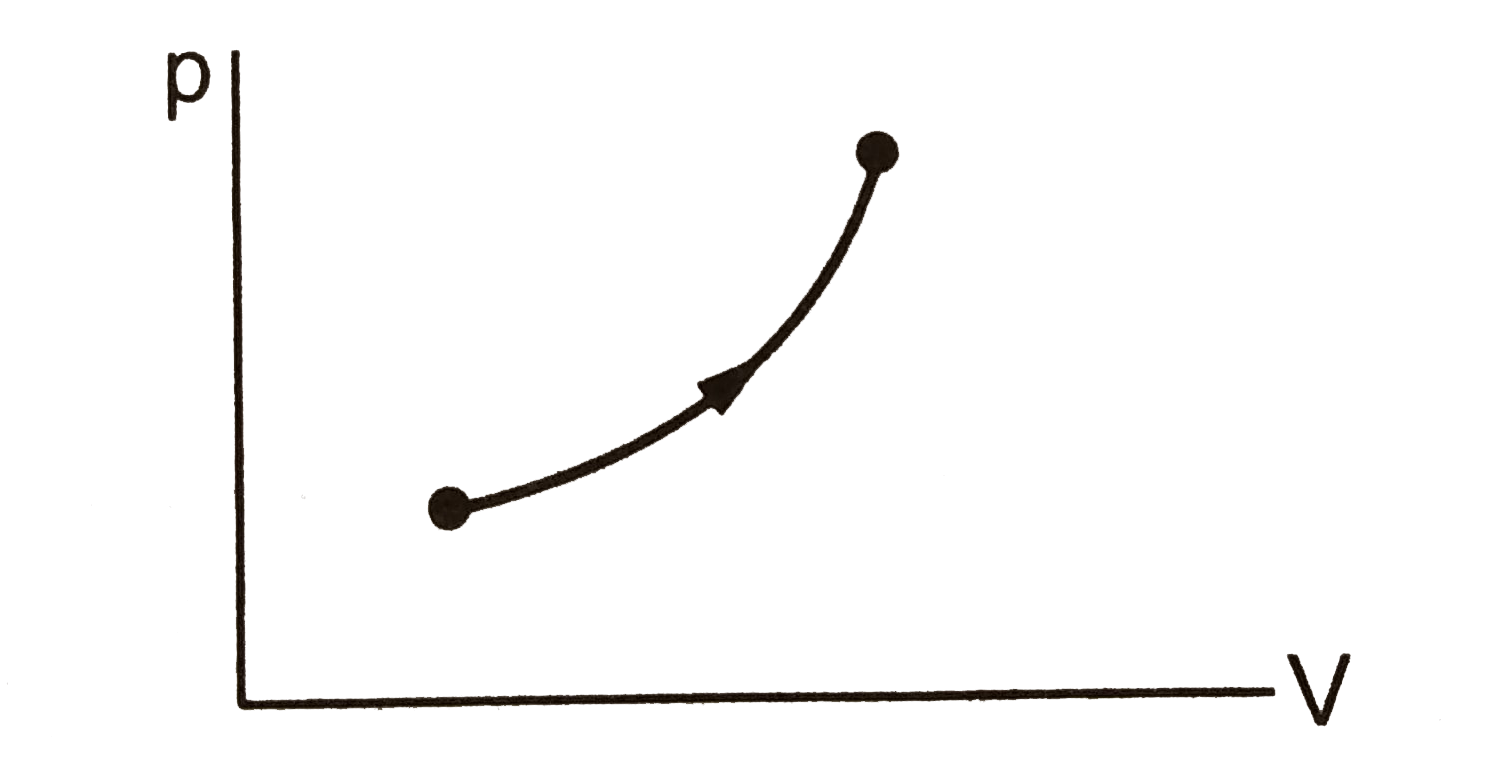Two moles of ideal helium gas are in a rubber balloon at 30∘C. The balloon is fully expandable and can be assumed to require no energy in its expansion. The temperature of the gas in the balloon is slowly changed to 35∘C. The amount of heat required in raising the temperature is nearly (take R
=8.31J/mol.K)
62 J
104 J
124 J
208 J
The correct Answer is:D
To find the amount of heat required to raise the temperature of two moles of ideal helium gas from 30∘C to 35∘C, we can use the formula for heat transfer in an isobaric process:
1. Identify the Process:
The gas is in a rubber balloon, which can expand freely. Therefore, the process is isobaric (constant pressure).
2. Use the Heat Transfer Formula:
The amount of heat Q required in an isobaric process is given by:
Q=nCpΔT
where:
- n = number of moles of gas
- Cp = molar heat capacity at constant pressure
- ΔT = change in temperature
3. Calculate the Change in Temperature:
The initial temperature Ti=30∘C and the final temperature Tf=35∘C.
ΔT=Tf−Ti=35∘C−30∘C=5∘C
4. Determine Cp for Helium:
Helium is a monatomic ideal gas. For a monatomic ideal gas, the molar heat capacity at constant pressure Cp is given by:
Cp=52R
where R=8.31J/(mol⋅K).
5. Substitute Values:
Now substituting Cp into the heat transfer formula:
Cp=52×8.31J/(mol⋅K)=20.775J/(mol⋅K)
6. Calculate Q:
Now substituting n=2 moles, Cp, and ΔT into the heat transfer formula:
Q=2×20.775J/(mol⋅K)×5K
Q=2×20.775×5=207.75J
7. Final Result:
The amount of heat required to raise the temperature is approximately:
Q≈208J
The gas is in a rubber balloon, which can expand freely. Therefore, the process is isobaric (constant pressure).
The amount of heat Q required in an isobaric process is given by:
Q=nCpΔT
where:
- n = number of moles of gas
- Cp = molar heat capacity at constant pressure
- ΔT = change in temperature
The initial temperature Ti=30∘C and the final temperature Tf=35∘C.
ΔT=Tf−Ti=35∘C−30∘C=5∘C
Helium is a monatomic ideal gas. For a monatomic ideal gas, the molar heat capacity at constant pressure Cp is given by:
Cp=52R
where R=8.31J/(mol⋅K).
Now substituting Cp into the heat transfer formula:
Cp=52×8.31J/(mol⋅K)=20.775J/(mol⋅K)
Now substituting n=2 moles, Cp, and ΔT into the heat transfer formula:
Q=2×20.775J/(mol⋅K)×5K
Q=2×20.775×5=207.75J
The amount of heat required to raise the temperature is approximately:
Q≈208J
Topper's Solved these Questions
- GASEOUS STATE & THERMODYNAMICSBOOK - VMC MODULES ENGLISHCHAPTER - GASEOUS STATE & THERMODYNAMICSEXERCISE - JEE MAIN (ARCHIVE )
81 Videos
- ENERGY & MOMENTUMBOOK - VMC MODULES ENGLISHCHAPTER - ENERGY & MOMENTUMEXERCISE - JEE ADVANCE (ARCHIVE) - TRUE/FALSE TYPE
1 Videos
- GRAVITATIONBOOK - VMC MODULES ENGLISHCHAPTER - GRAVITATIONEXERCISE - JEE Advance (Archive) TRUE/FALSE
1 Videos
Similar Questions
A cylinder of fixed capacity 44.8 litres contains helium gas at NTP. Find the amount of heat required to raise the temperature of gas by 15.0∘C.(Given R=8.31J/molK).
View Solution70 calories of heat is required to raise the temperature of 2 mole of an ideal gas at constant pressure from 30^@C to 35^@C . The amount of heat required to raise the temperature of the same gas through the same range at constant volume is

View Solution70 calories of heat is required to raise the temperature of 2 mole of an ideal gas at constant pressure from 30∘C to 35∘C . The amount of heat required to raise the temperature of the same gas through the same range at constant volume is

View SolutionQ cal of heat is required to raise the temperature of 1 mole of a monatomic gas from 20∘C to 30∘C at constant pressure. The amount of heat required to raise the temperature of 1 mole of diatomic gas form 20∘C to 25∘C
View SolutionThe ammount of heat required to raise the temperature of 1 mole of diatomic gas by 1∘C at constant pressure is 60cal . The amount of heat which goes as internal energy of the gas is nearly.
View Solution70 calories of heat required to raise the temperature of 2 moles of an ideal gas at constant pressure from 30∘C→35∘C. The amount of heat required (in calories) to raise the temperature of the same gas through the same range (30∘C→35∘C) at constant volume is:
View Solution70 calories of heat required to raise the temperature of 2 moles of an ideal gas at constant pressure from 30∘C→35∘C. The amount of heat required (in calories) to raise the temperature of the same gas through the same range (30∘C→35∘C) at constant volume is:
View Solution70 calories of heat required to raise the temperature of 2 moles of an ideal gas at constant pressure from 30∘C→35∘C. The amount of heat required (in calories) to raise the temperature of the same gas through the same range (30∘C→35∘C) at constant volume is:
View SolutionA cylinder with fixed capacity of 67.2 lit contains helium gas at STP. The amount of heat needed to raise the temperature of the gas by 20∘C is :[Given that R=8.31] mol−1K−1]
View SolutionTwo moles of an ideal monatomic gas occupies a volume V at 27 °C. The gas expands adiabatically to a volume 2V. Calculate (i) the final temperature of the gas and (ii) change in its internal energy.
View Solution
